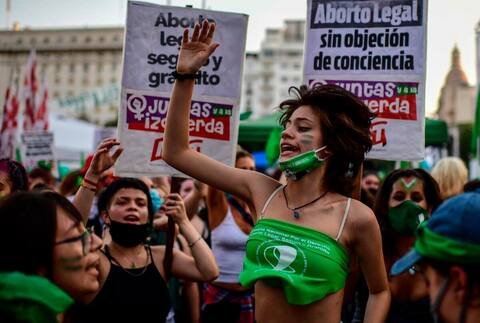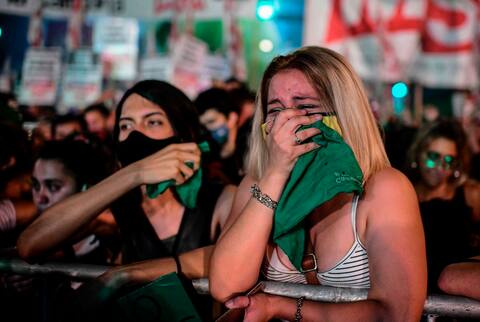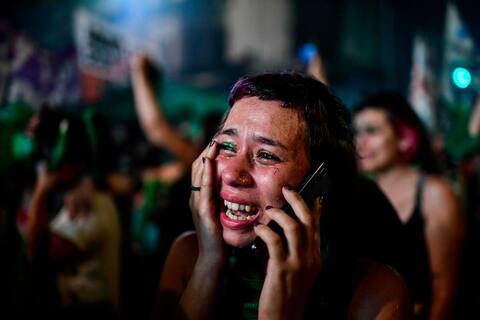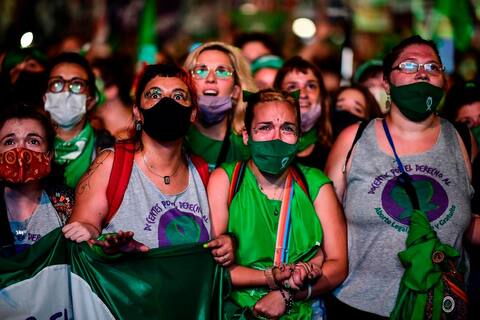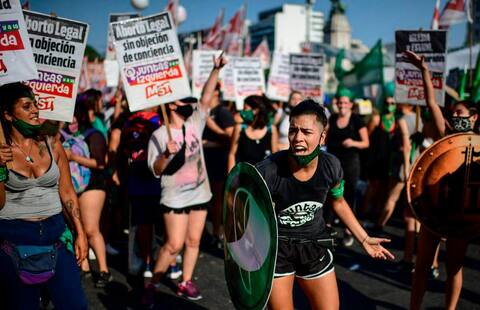BUENOS AIRES | Argentina on Wednesday became one of the few Latin American nations to allow abortion, after parliament passed a law that deeply divides public opinion.
Already approved by deputies on December 11, the text authorizing abortion up to 14 weeks of pregnancy was voted on by senators with 38 votes for, 29 against and one abstention, two years after the failure of a first attempt .
“It has become a law and it now passes into the hands of the executive”, welcomed the President of the Senate and former Head of State, Cristina Kirchner, after another Homeric debate. twelve hours.
Thousands of people campaigning for abortion expressed their joy in front of Parliament, where only a few senators were present, most debating by videoconference due to the COVID-19 pandemic.
“After so many attempts and years of struggle that spilled blood and cost us lives, today we have finally made history. Today, we are leaving a better world for our children, ”Sandra Lujan, a 41-year-old psychologist, who participated in the vigil organized by supporters of abortion, told AFP.
Until now, abortion was only allowed in Argentina in cases of rape or danger to the life of the mother, under a law dating from 1921.
“A better society”
While the deputies had voted the text by 131 votes for, 117 against and six abstentions, the vote of the Senate, deemed more conservative, seemed far from certain.
In 2018, he rejected by seven votes a similar text in a country still very Catholic and deeply divided on the issue.
“This law does not oblige to abort, it does not promote abortion, it only gives it a legal framework”, declared during the debates the senator member of the majority Sergio Leavy.
In power since the end of 2018, center-left president Alberto Fernandez, who had promised during his campaign to resubmit the legalization of abortion to parliamentarians, welcomed this law establishing “a safe, legal and free abortion”.
“Today we are a better society which extends the rights of women and guarantees public health”, reacted the Head of State on Twitter.
“I am Catholic, but I must legislate for everyone, it is a very serious public health issue,” he had previously argued.
Without direct reference to Argentina or the adoption of the law, Argentinian Pope Francis said Wednesday at his last general audience of the year: “Christians, like all believers, bless God for gift of life. To live is above all to have received life. We were all born because someone wanted life for us ”.
In Brazil, far-right President Jair Bolsonaro has criticized the legalization of abortion, declaring that “the lives of Argentinian children” can be “mowed down in their mother’s womb” with “the consent of the state” .
“Inspiration”
Despite the pandemic, several thousand Argentines had gathered on both sides of Parliament to express their support or their rejection of the text, with many banners, music and giant screens broadcasting the debates live.
“Senators, it’s now!” could we read on the side of supporters of abortion. “We save two lives,” proclaimed opponents of abortion.
The Catholic Church and the Evangelical Protestants, hostile to the text, had launched a call to “unite to implore respect and care for the life to be born”, with a day of fasting and prayer.
“Today, Argentina has moved back several centuries of civilization and respect for the supreme right to life,” the Christian Alliance of Evangelical Churches (Aciera) lamented on Wednesday in a statement.
Supporters of abortion, rallied around the color green, have carried out an intense campaign on social networks. In particular the Campaign for a legal, safe and free abortion, which brings together hundreds of feminist organizations, already very mobilized in 2018.
UN High Commissioner for Human Rights Michelle Bachelet welcomed the decision and noted that “almost all abortion-related deaths occur in countries that criminalize or severely restrict it, forcing women to resort to dangerous procedures, ”in a tweet from its services.
This law will serve as “inspiration for other countries in the region and the world to advance in the recognition of access to legal and safe abortion,” said Amnesty International.
According to the government, between 370,000 and 520,000 clandestine abortions are performed each year in Argentina, a country of 44 million people, where 38,000 women are hospitalized for complications from clandestine abortions.
In an attempt to convince the senators to vote for the text, it included the possibility for doctors to assert their “conscientious objection”.
At the same time, another bill creates an allowance of “1000 days” intended to support mothers during their pregnancy and the first years of the child, in order to reduce abortions for economic reasons.
With this text, Argentina joins Cuba, Uruguay, Guyana, Mexico City and the Mexican state of Oaxaca, the only ones to allow abortion unconditionally in Latin America.
Abortion laws vary greatly around the world
Total ban
El Salvador adopted draconian legislation in 1998 which prohibits the termination of pregnancy in all circumstances, even in cases of risk to the life of the mother. Abortion is punishable by two to eight years in prison. But beyond 22 weeks of pregnancy, the loss of a baby can be considered as an “aggravated homicide” punishable by 30 to 50 years of imprisonment. According to NGOs, around 20 women are detained in El Salvador because of this law.
Malta, where Catholicism is the state religion, is the only country in the European Union that completely prohibits voluntary termination of pregnancy (abortion). The penalty ranges from 18 months to three years in prison.
In the rest of the world, abortion is prohibited in about fifteen countries: Congo, Djibouti, Egypt, Guinea-Bissau, Madagascar, Democratic Republic of Congo, Senegal in Africa; Honduras, Nicaragua, Surinam, Haiti and the Dominican Republic in America; Philippines and Laos in Asia; Palau in Oceania.
Restricted
In many countries abortion is subject to extremely restrictive conditions.
Thus abortion is only accessible in the event of danger to the mother’s life in countries such as Côte d’Ivoire, Libya, Uganda, South Sudan, Iraq, Lebanon , Syria, Afghanistan, Yemen, Bangladesh, Burma, Sri Lanka, Guatemala, Paraguay and even Venezuela.
In Brazil, access to abortion is also very limited, in cases of rape, risk to the mother or serious malformation of the fetus.
In 2017, Chile ended almost 30 years of total ban on abortion, now authorized in cases of risk to the life of the mother, rape or non-viability of the fetus.
In Poland, the Constitutional Court restricted, by a decision of October 22, the right to abortion. This judgment leads to the prohibition of abortions, even in the event of a serious malformation of the fetus. Abortion is only allowed in cases of rape or incest, or when the mother’s life is in danger.
Law sometimes recent and under pressure
Overall, it is the women of Europe, North America and Oceania who benefit from the most liberal legislation, sometimes acquired very recently.
In Argentina, the text authorizing abortion up to 14 weeks of pregnancy was adopted Wednesday by Congress. Until now, abortion was only allowed in cases of rape or danger to the life of the mother, according to a law of 1921. A previous attempt at legalization had been rejected in 2018 by the senators.
New Zealand did not decriminalize abortion until March 2020, which was previously punishable by 14 years in prison, a theoretical penalty that was not applied.
In Australia, the state of Queensland legalized abortion in October 2018 and only New South Wales, the most populous state in the country, continues to outlaw abortion.
In South Korea, the country’s highest court ordered in April 2019 the lifting of the ban on abortion, deemed unconstitutional, and demanded an evolution of very restrictive legislation (possible abortion in cases of rape, incest or threat to the health of the mother). In early October, the government introduced a bill authorizing abortion up to 14 weeks gestation, which angered anti-abortionists and also unsatisfied supporters of abortion.
In Ireland, abortion has only been legal since September 2018, following a historic referendum repealing the constitutional ban on abortion in this Catholic country. It was also liberalized in October 2019 in Northern Ireland, the only part of the UK where it remained banned.
In the United States, where abortion was authorized by a Supreme Court ruling in 1973, the debate was revived during the presidential campaign. Democratic President-elect Joe Biden has promised to perpetuate the right to abortion by pushing Congress to enshrine it in law.
But abortion advocates fear a backsliding of the Supreme Court, after, in particular, the appointment, by Donald Trump, of conservative magistrate Amy Coney Barrett, a fervent Catholic and opposed to abortion.
In France, deputies adopted at first reading, at the beginning of October, the extension of the legal period of access to abortion from 12 to 14 weeks of pregnancy (16 weeks of amenorrhea). This text should be examined by the Senate from January 20.
